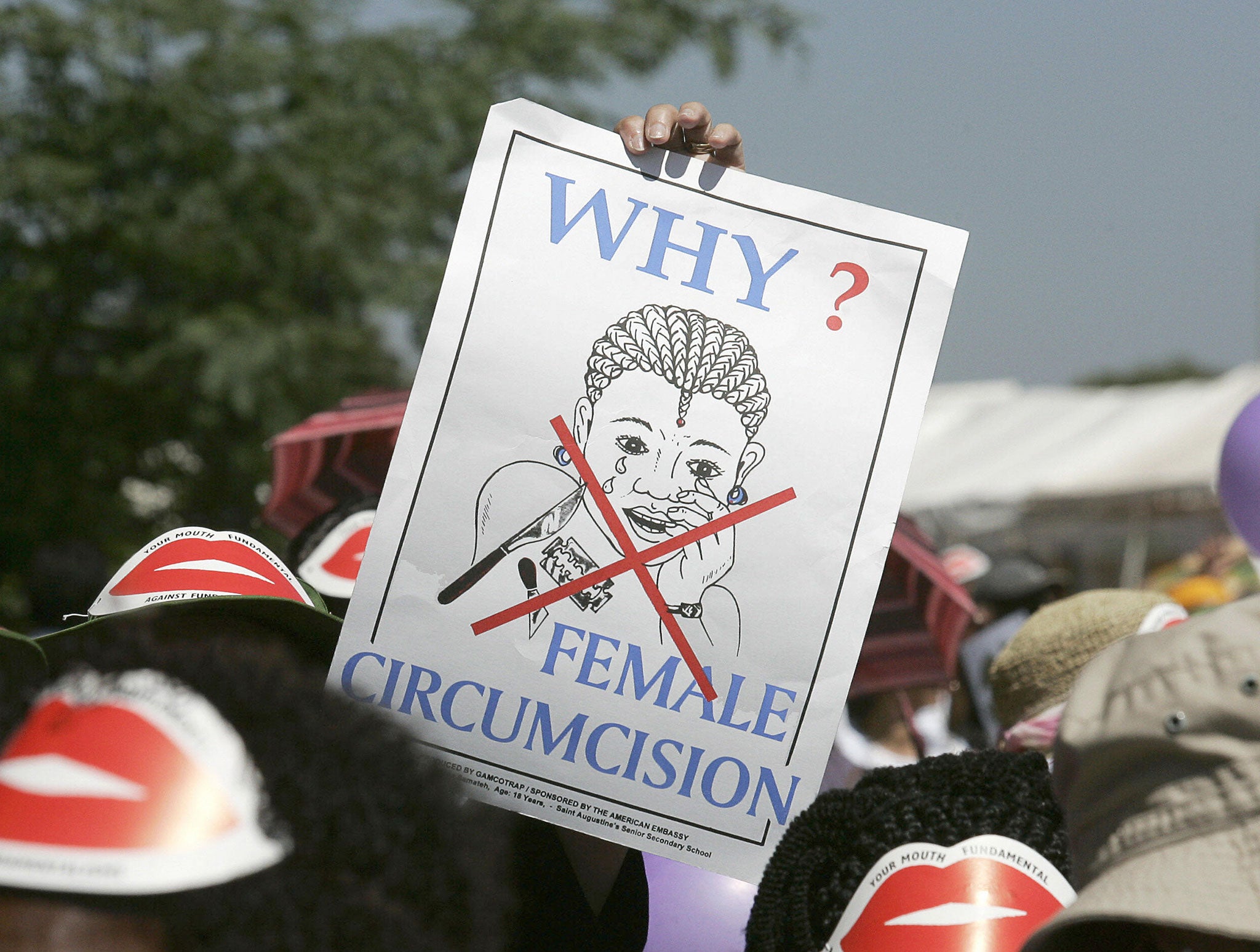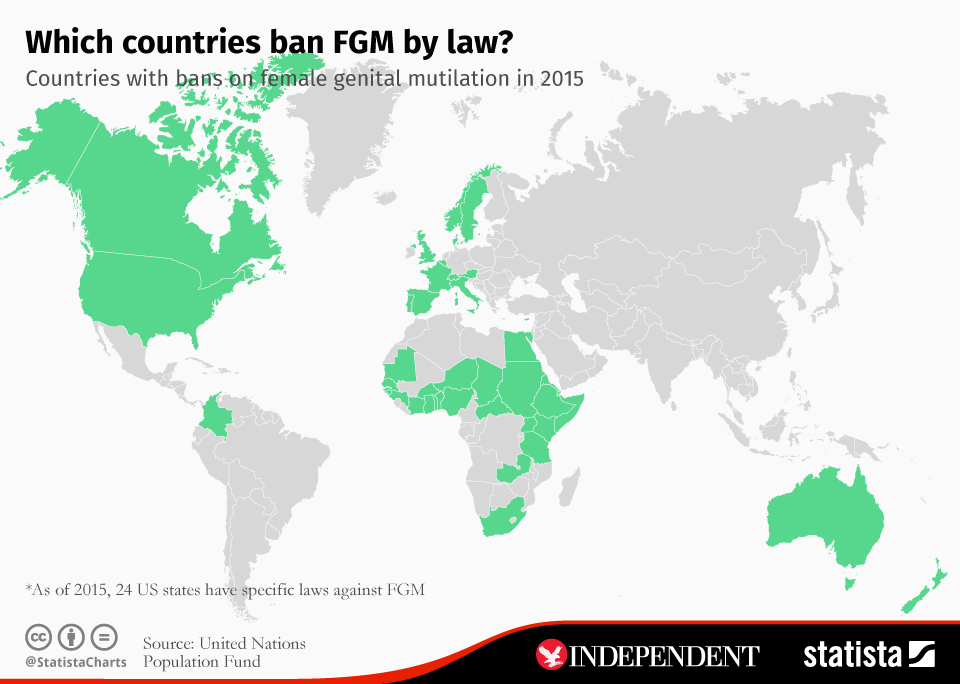Drop in number of new FGM cases reported could be misleading, charity warns
Fall in numbers could be linked to fears of child protection services being called in

Fears of having children taken into care may be driving a recent drop in the number of women and girls who have experienced female genital mutilation (FGM) identified by the NHS, a charity has warned.
NHS Digital figures published this week show that the number of new cases of FGM reported by the NHS between July and September has fallen by a third since reporting first started in April 2015.
The latest figures show 1,060 women were identified in the NHS as having experienced FGM, also known as female circumcision or “cutting”, down from 1,570 in the first quarter of reporting.
This is the lowest number to date, down on the previous quarter in 2017 when 1,255 new cases were identified.
Earlier analysis showed one woman or girl with FGM is identified or treated every hour by the NHS, and it is thought to affect 200 million women and girls worldwide.

The practice originated in Africa before being more widely picked up in Islamic sects and carried on in migrant communities around the world.
FGM is reported on every continent, and in England and Wales every local authority has reported cases of FGM according to research by charities.
The Local Government Association, which represents councils, said the fact that 14,250 women had been identified in two years showed the “scale of the challenge” to tackle FGM.
It added that while the recent fall of 1,000 new cases last quarter was “encouraging”, it was still far too high, in particular the 15 cases of girls under the age of 18.
Charities told The Independent that the numbers unearthed by the NHS are just the tip of the iceberg and work was needed to address understanding amongst patients and medical professionals.
Aneeta Prem is the founder of charity Freedom, which runs FGM awareness sessions with health professionals, and has authored a book on the issue for students and teachers.
“I don’t think we are making a dent in it,” she told The Independent.
“The women we speak to are less likely to want to come forward and disclose because the consequences are, if they’re having children the girls could be put on a child protection register and FGM protection orders come into play.
“Our understanding - after speaking to many, many women affected by FGM - is that they don’t want to report it.”
She added some professionals might not be reporting FGM because they believe it would undermine patient confidentiality.
“Some midwives are particularly brilliant,” Ms Prem said.
“But even if they have identified FGM they might not report it on. Even though there’s a mandatory responsibility to, they say they’re not prepared to report it because the confidentiality for their patient.”
The charity focuses on ensuring midwives understand how to report this sensitively, but said prosecutions of people performing female circumcision were needed to stamp the practice out.
Janet Fyle, the Royal College of Midwives’ lead on FGM, received an MBE in 2016 for her work on tackling it.
She made clear to The Independent that the RCM has not heard from any of their members concerns about identifying a case of FGM because of the ramifications around safeguarding.
“It’s very important that we don’t underestimate the work that has gone on around FGM. I’m not saying it’s perfect, but we haven’t heard that [concern about reporting FGM] from our members who are midwives," she said.
“Safeguarding is not only about FGM, it’s about all aspects of safeguarding children and girls.
“A health professional will not back off if there are safeguarding concerns.
“Their first duty is to protect the child, or even the adult woman, if they are vulnerable.”
However she added that while the NHS was doing important work identifying FGM victims, providing services to support them is “a different question".
Ninety per cent of the cases in the NHS figures were reported in hospital Obstetrics and Gynaecology departments, which would predominantly be for maternity care.
The international women’s health charity Forward works with communities in the UK, Europe and Africa to end the view of female circumcision as an important cultural practice.
It told The Independent the prevalence of hospital discoveries could mean other women might be missed in the statistics.
“It’s very good that they’ve started collecting the data, but I don’t think this is the whole picture,” said Adwoa Kwateng-Kluvitse, Forward’s head of global advocacy and partnerships.
“This data won’t pick up on the vast numbers of women who don’t seek maternity services, or who don’t have a FGM or gynaecological problem.”
Forward said more could be done by GPs to ask women about FGM.
“Nothing can persuade me that there aren’t a lot of women going into GP surgeries with FGM and not being asked about it.”
She said for health professionals this meant very careful conversations with women who may not recognise the term FGM or the impact of it.

Specialist services in the community can help women discuss and understand FGM and are needed alongside medical and psychological support.
But pressures on local authority budgets have seen these services cut in many places.
“The specialist services are closing down, there’s greatly reduced funding for specialist services, generally,” Jacqui Hunt, director of the charity Equality Now in Europe, told The Independent.
“More training for GPs would be helpful too, because we’ve seen FGM is a problem in all areas of the country.
“We can’t necessarily expect specialised services in all areas but all areas can build this consideration in to their existing services.”
She said the latest drop could be down to a “range of different factors” but said a “renewed focus” from Government and councils on the services available to help newly identified women was now needed.
A Department for Health Spokesperson said: "Female Genital Mutilation devastates lives, so it’s imperative the NHS supports survivors with the care that they need.
"Ultimately, we want to protect future generations of girls, and end FGM once and for all. To achieve this we must first understand the scale of the problem, which is why we collect data on FGM across the NHS.”
Join our commenting forum
Join thought-provoking conversations, follow other Independent readers and see their replies
Comments
Bookmark popover
Removed from bookmarks